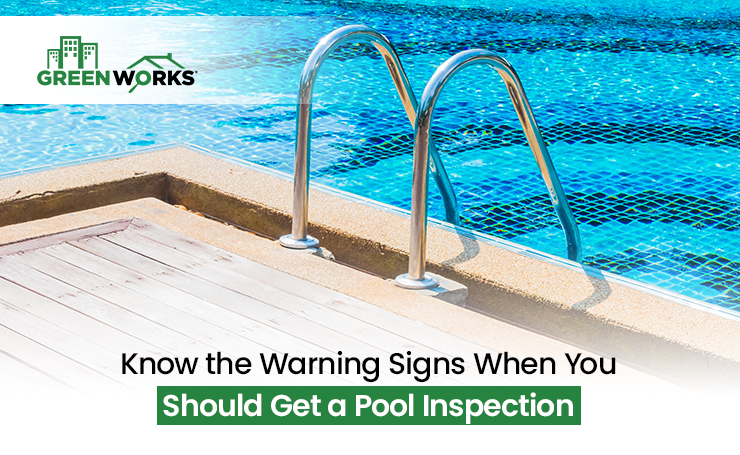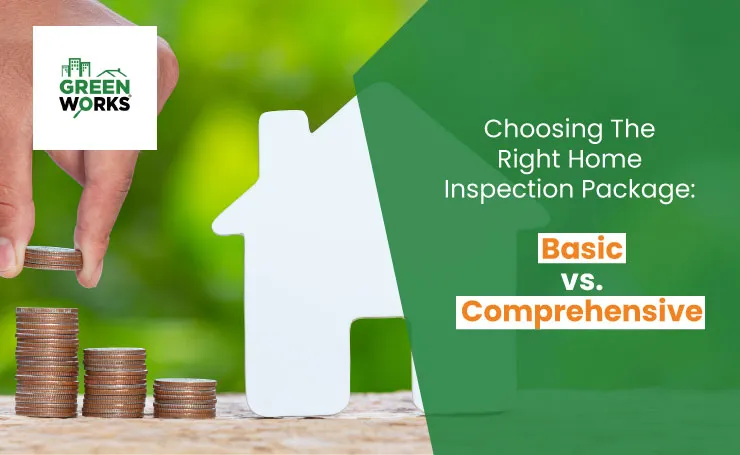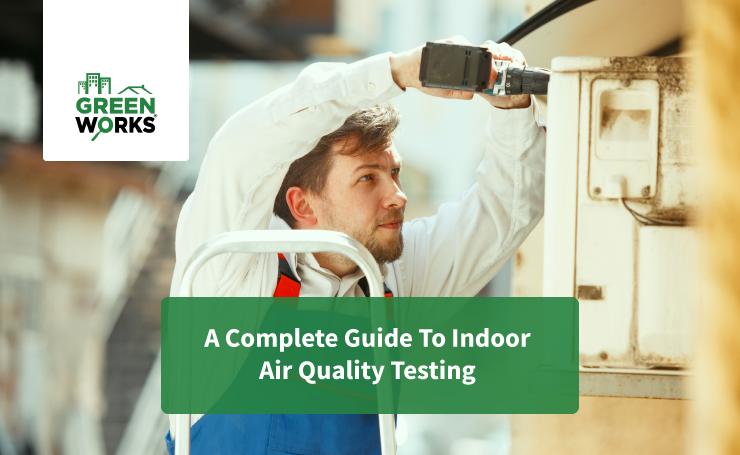Posts

Know the Warning Signs When You Should Get a Pool Inspection
Swimming is one of the fun activities we enjoy in the summer. But only some people know or notice the problems with their pool and their warning signs. It may include algae growth, the use of outdated equipment, flow obstructions, or connection issues. That’s where a professional pool inspection saves your pool’s integrity and your life.
GreenWorks brings you this ultimate guide to reveal your pool’s problems and the clear indications you might have ignored before. We will also walk you through how a home inspection helps you with your pool problems.
Warning Signs that You Need a Professional Pool Inspection
Have you been ignoring your pool’s well-being for a long time? Or are you buying a new home with a pool? In either case, you must know some cues to get a professional pool inspection. So, here are some signs to look for in your pool:
Damaged Pool
A pool with visible damage needs instant attention and a professional pool inspection. A damaged pool may involve cracks, leaks, or bulges. Timely pool inspections can prevent this damage, saving you costly and repetitive repairs in the long run. Several factors could damage your pool, such as drain rain, melted snow, frozen pool pump, filter, deck, or skimmers. Moreover, imbalanced chlorine and water levels or irregular cleaning damage a pool.
Electrical Issues
A pool gets help from various electrical components and runs by several electrical phenomena, such as bonding and grounding. However, there could be some electrical issues with your pool, for instance, equipment wiring. The pool equipment wiring may include a pool pump, gas heater, booster pump, salt generator, pool light, and timer clocks. The burning of light bulbs, missing GFCIs (ground-fault circuit interrupters), and poorly installed junction boxes are also some of the electrical problems of a pool.
Flow Obstructions
If your pool water circulation is poor, there can be flow obstructions in several components, such as plumbing and filter systems. Improper plumbing fittings and pipe leakage may also obstruct flow, affecting the water quality and pool safety.
Connection Issues
If the pool’s filtration or plumbing has loose or damaged connections, it can result in severe problems, such as leaks, in the future. It also includes the incorrect heater installation, dirty filters, and improper bonded metal around the pool.
Outdated Equipment
Outdated equipment with visible wear and tear, signs of corrosion, unstable structure, or overall inefficient functioning can cost more energy charges. Moreover, such equipment has a higher potential for breakdowns.
Pool Interior and Deck Hazards
Hidden cracks, slippery surfaces, or loose tiles on the pool interior can lead to pool accidents like slips and falls. The pool deck area can be subject to algae growth with time. You shouldn’t take either situation lightly.
How Pool Inspections Can Rescue Your Pool from Potential Problems
A pool inspection is significant if you are buying or selling a home or are concerned about your pool’s condition. A professional pool inspection company like GreenWorks will help you uncover any hidden problems, highlight severe damages, address safety concerns, and recommend suitable solutions.
Hiring a pool inspector brings you as many benefits as you can imagine. Besides getting valuable insights into your pool’s condition, functionality, and security features, a pool inspection can save you from potential accidents. Here’s how pool inspection can rescue potential pool problems:
Detect Leaks
If you hire a professional pool inspection company, you can detect potential problems like leaks early on. This will control water loss, moisture or water damage, and structural damage.
Inspect a Pool Shell
The pool inspector inspects the pool shells to detect any cracks or damage. This also prevents costly structural problems and repairs.
Check the Water Quality
During a pool inspection, the inspector checks the pool’s water quality to ensure optimal water, pH, and chlorine levels. It will help you meet safety and sanitation standards and address problems earlier.
Prevent Costly Repairs
A professional pool inspection detects existing and potential problems early on, so you can address them promptly. As a result, you can save on hefty repair expenses in the future.
Assess Pool Equipment
Inspections evaluate the condition and performance of pool equipment, so you never have to compromise your fun time due to poor equipment.
Identify Safety Concerns
The professional pool inspectors will identify the safety features of your pool. They will advise you on the best solution if any issues are found.
Top Pool Problems You Might Not Know
Now that you know the signs for pool problems and how a pool inspector highlights them – let’s head toward the actual pool problems. Your pool could be subject to several problems, apparent or underlying, that you might be overlooking. Here are some top pool problems you must know
Scaling
Scaling is sandpaper-like sediments around the pool caused by excess calcium or metal levels in the pool water. These higher calcium and metal levels harden the pool water. Moreover, scaling also damages pool structure and pool equipment’s functionality.
pH Imbalance
If your pool has an imbalanced pH level, it can cause several safety challenges, such as corrosion or scale formation and discomfort for the swimmers.
Algae Growth
Algae growth can turn your crystal clear pool into a green, slimy mess. This will not only make your pool unappealing but also pose health problems.
Possible Drowning
Drowning is a real pool risk that could be better detected by inspecting safety features. If your pool has been unattended for a long time, it could be dangerous for children and pests.
Too Much Chlorine
Maintaining a balance for chlorine levels is crucial. A higher chlorine level can irritate the skin or eyes, causing an uncomfortable swimming experience.
Clogged Pool Filter
If your pool has clogged filters, it can hinder the water circulation. This will affect the pool water’s quality and purity.
Conclusion
Your pool should be a source of refreshment rather than a source of stress or health problems. Therefore, a pool inspection helps you ensure your safety, optimal pool condition, pure water quality, and whatever it takes to make your pool time – a fun time. This blog discussed several pool problems and signs of these problems. Moreover, we also talked about how a professional pool inspection highlights these issues and advises on them.
FAQs
How Do You Know If a Pool Is Safe to Get In?
Consider getting regular pool inspections to look for any signs of damage. Moreover, it will also help you ensure pool safety and pH balance and monitor chlorine levels.
Can You Swim in a Pool With a Little Bit of Algae?
Experts advise against swimming in a pool with algae as it can cause health hazards.
Is a Chlorine Level of 5 Safe to Swim?
The optimal chlorine level is maintained between 1 to 3. A chlorine level of 5 is too high and can cause discomfort for swimmers.
Do You Really Need to Shower After Pool?
After swimming, taking a shower will rinse any chemicals you got on yourself from the pool, like chlorine. This will prevent skin or hair damage, irritation, or potential hazards.




